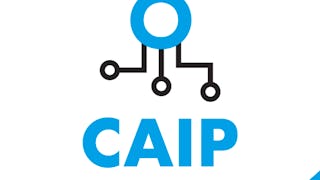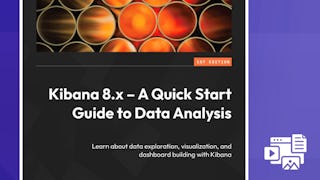- Browse
- Deep Learning
Deep Learning Courses
Deep learning courses can help you learn neural networks, convolutional networks, and recurrent networks, along with their applications in image recognition and natural language processing. You can build skills in model training, hyperparameter tuning, and performance evaluation, which are crucial for developing effective AI solutions. Many courses introduce tools like TensorFlow and PyTorch, allowing you to implement algorithms and optimize models, making your learning experience hands-on and relevant to current industry practices.
Popular Deep Learning Courses and Certifications
 Status: Free TrialFree TrialM
Status: Free TrialFree TrialMMacquarie University
Skills you'll gain: Video Production, Infographics, Course Development, Developing Training Materials, Multimedia, Podcasting, Digital pedagogy, Content Creation, Constructive Feedback, Instructional Design, Design Reviews, Education Software and Technology, Pedagogy, Learning Management Systems, Storyboarding, Teaching, Design, Collaborative Software, Planning, Virtual Environment
4.7·Rating, 4.7 out of 5 stars419 reviewsBeginner · Specialization · 3 - 6 Months
 Status: Free TrialFree TrialG
Status: Free TrialFree TrialGGoogle Cloud
Skills you'll gain: Large Language Modeling, Google Gemini, Prompt Engineering, LLM Application, Generative AI
4.5·Rating, 4.5 out of 5 stars1.3K reviewsBeginner · Course · 1 - 4 Weeks
 Status: Free TrialFree Trial
Status: Free TrialFree TrialSkills you'll gain: Data Ethics, Responsible AI, Regulatory Compliance, Business Ethics, Compliance Management, AI Enablement, Applied Machine Learning, Project Implementation, AI Product Strategy, Business Solutions, Solution Design, Artificial Intelligence and Machine Learning (AI/ML), Machine Learning, Model Evaluation, MLOps (Machine Learning Operations), Data-Driven Decision-Making, Machine Learning Algorithms
4.4·Rating, 4.4 out of 5 stars111 reviewsIntermediate · Course · 1 - 4 Weeks
 Status: NewNewStatus: Free TrialFree Trial
Status: NewNewStatus: Free TrialFree TrialSkills you'll gain: Sample Size Determination, Data Strategy, Analytical Skills, Data-Driven Decision-Making, Data Analysis, Analytics, Jupyter, Data Science, Statistical Analysis, Data Collection, Data Mining, Data Management, MLOps (Machine Learning Operations), Research and Design, Version Control, Software Documentation
Intermediate · Course · 1 - 4 Weeks
 Status: NewNewStatus: PreviewPreviewS
Status: NewNewStatus: PreviewPreviewSStarweaver
Skills you'll gain: Medical Privacy, Health Insurance Portability And Accountability Act (HIPAA) Compliance, Incident Response, Security Controls, Computer Security Incident Management, Health Information Management, Data Security, Cyber Risk, Personally Identifiable Information, Regulatory Compliance, Risk Management, Threat Management, Data Management, Threat Modeling, Cybersecurity, ISO/IEC 27001, Compliance Management, Continuous Monitoring
Advanced · Course · 1 - 3 Months
 Status: NewNew
Status: NewNewSkills you'll gain: Kibana, Dashboard, Interactive Data Visualization, Data Visualization, Data Visualization Software, Grafana, Graphing, Data Analysis, Splunk, Real Time Data, Anomaly Detection, Applied Machine Learning, Time Series Analysis and Forecasting, Query Languages, SQL, Role-Based Access Control (RBAC), Qualitative Research
Beginner · Course · 1 - 3 Months
 Status: Free TrialFree TrialU
Status: Free TrialFree TrialUUniversity of California, Davis
Skills you'll gain: Keyword Research, Search Engine Optimization, Web Analytics and SEO, Search Engine Marketing, Content Strategy, Competitive Analysis, Forecasting, Content Performance Analysis, Expectation Management, Relationship Management, Content Marketing, Content Creation, Marketing, A/B Testing, Key Performance Indicators (KPIs), Goal Setting, Internal Auditing
4.7·Rating, 4.7 out of 5 stars1.7K reviewsIntermediate · Course · 1 - 4 Weeks
 Status: PreviewPreviewT
Status: PreviewPreviewTThe University of Edinburgh
Skills you'll gain: Goal Setting, Smart Goals, Patient Education And Counseling, Community Health, Health Education, Health Promotion, Preventative Care, Exercise Science, Self-Motivation, Behavioral Health, Activities of Daily Living (ADLs), Occupational Health, Chronic Diseases
4.6·Rating, 4.6 out of 5 stars1.8K reviewsBeginner · Course · 1 - 3 Months
 Status: NewNewStatus: Free TrialFree Trial
Status: NewNewStatus: Free TrialFree TrialSkills you'll gain: Jira (Software), Issue Tracking, Investigation, Data Quality, Data Validation, Data Integrity, Reconciliation, Change Control, Anomaly Detection, Dependency Analysis, Verification And Validation, Trend Analysis, Analysis, Project Documentation, Auditing, Workflow Management, Project Management, Leadership and Management
Beginner · Course · 1 - 4 Weeks
 Status: NewNewStatus: Free TrialFree TrialA
Status: NewNewStatus: Free TrialFree TrialAAlex Genadinik
Skills you'll gain: Prioritization, Productivity, Time Management, Professional Development, Personal Development, Stress Management, Strategic Prioritization, Organizational Skills, Business Priorities, Scheduling, Self-Starter, Strong Work Ethic, Decision Making, Data-Driven Decision-Making
Mixed · Course · 1 - 3 Months
 Status: PreviewPreviewU
Status: PreviewPreviewUUniversity of London
Skills you'll gain: Diplomacy, International Relations, Crisis Intervention, Sustainable Development, Political Sciences, Public Policies, Social Justice, Governance, Advocacy, Policy Analysis, Human Development, World History, Case Studies
4.7·Rating, 4.7 out of 5 stars1.9K reviewsBeginner · Course · 1 - 3 Months
 Status: NewNewStatus: Free TrialFree Trial
Status: NewNewStatus: Free TrialFree TrialSkills you'll gain: Augmented and Virtual Reality (AR/VR), Game Design, User Interface (UI)
Beginner · Course · 1 - 3 Months
Searches related to deep learning
In summary, here are 10 of our most popular deep learning courses
- Online Learning Design for Educators: Macquarie University
- Introduction to Large Language Models: Google Cloud
- Solve Business Problems with AI and Machine Learning: CertNexus
- Evaluate and Reproduce Data Findings Fast: Coursera
- Healthcare Data Security & Risk Management: Starweaver
- Kibana 8.x – A Quick Start Guide to Data Analysis: Packt
- Optimizing a Website for Google Search: University of California, Davis
- Sit Less, Get Active: The University of Edinburgh
- Verify Jira History: Confirm Accuracy Fast: Coursera
- Time Management: Alex Genadinik










